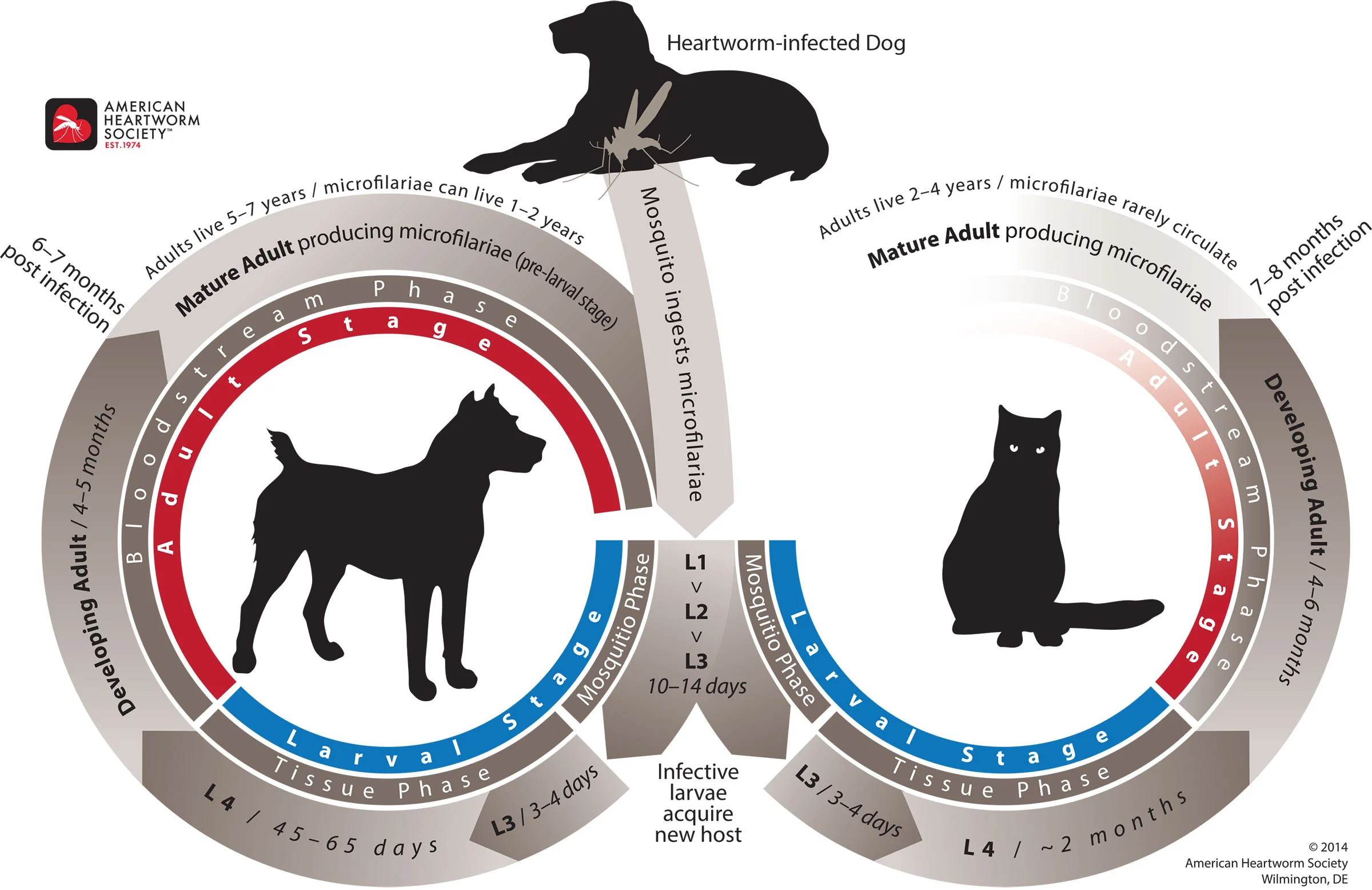The Facts About Heartworm Prevention and Testing
The Facts About Heartworm Prevention and Testing
It has come to my attention that there are several misconceptions about how heartworm prevention and testing work. To clarify this matter, I would like to address how heartworm prevention works against heartworms and how the testing works to detect heartworm disease.
Most types of heartworm prevention prevent against intestinal parasites and heartworm disease - it is more accurate to refer to heartworm prevention as parasite prevention. Heartworm prevention for the most part consists of some type of antiparasitic medication such as Ivermectin, Milbemycin oxime, Selemectin, or several others. Depending on the type of prevention, it is also combined with an antiparasitic for intestinal parasites. In order to understand how the prevention works, we need to briefly review the heartworm life-cycle.
Heartworms are transmitted via the bite of a mosquito. A mosquito will land on an infected dog (or coyote) and ingest blood that is infected with baby heartworms (also known as microfilaria or larvae). These baby heartworms have to mature in the mosquito for about 10 - 14 days. After that time they are ready to move on. The next time that mosquito bites a dog the larvae are deposited on the dog and they crawl through the hole and into the dog's body. They spend about 2 months in the tissues of the dog maturing and working their way to the heart and into the bloodstream. They then spend another 3 to 5 months developing into fully mature adult heartworms. At this stage they are living in the heart and the arteries within the lungs, and they begin to produce larvae or microfilaria of their own. Then the cycle begins all over again.
Heartworm prevention kills off the microfilaria within the dog's body. It does not work on adult heartworms that are already mature in the heart and lungs of the dog. It actually works by what is known as a reach back method. So when you are giving your dog heartworm prevention, you are actually killing all the microfilaria that have been deposited on your dog over the last 30 days. I know that in the holistic community there is debate about giving heartworm year round. One of the reasons year round is recommended is that it is thought that 30% of heartworm positive dogs are infected during the winter months. I believe that this is because people stop giving prevention too soon. Some people stop giving heartworm prevention in November or December. The problem is that if you stop in these months you are not killing off any microfilaria that were given to your dog in October or November. Most of the time, October is certainly warm enough for there to still be mosquitoes out transmitting heartworm disease. I do not say this to start a debate about what is the best method, but to help people understand better how to use whichever method they are using.
There also seems to be a misconception about how heartworm testing works. Many of the people who do not do heartworm prevention year round do a heartworm test in the spring before they start their dog on heartworm prevention. This is great if you are looking to follow manufacturer recommendations so they will cover treatment if your pet comes up positive (you also have to retest in 6 months, and keep your dog on prevention year round), but not so much if you are looking to determine if your dog became positive while they were off prevention over the winter. The most commonly used heartworm tests are what are called ELISA tests and they are testing for a protein that mature female heartworms produce. Therefore, looking back on the lifecycle, if your dog is infected with heartworms the soonest you will be able to tell is 5 - 7 months AFTER they were infected with heartworm disease.
To summarize, heartworm prevention is actually better termed parasite prevention. It has a 30 day reach-back effect and kills heartworm larvae that were deposited over the last 30 days. Finally, the testing can not detect a positive dog until 5 - 7 months after they have been infected. I hope this clears up some of the confusion about heartworm disease, please let us know if you have any questions we can clarify for you. Also, some great information can be found on the American Heartworm Society's website https://www.heartwormsociety.org/pet-owner-resources.

